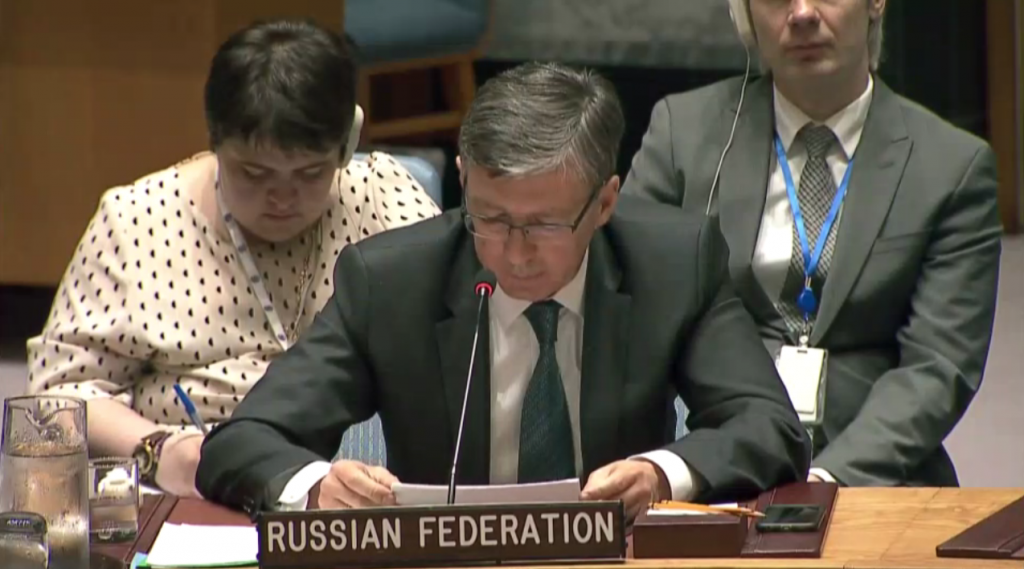Statement by Mr. Evgeniy Zagaynov, Deputy Permanent Representative of the Russian Federation to the United Nations, at the Security Council on the reports of the leadership of the International Tribunal for the Former Yugoslavia (ICTY) and the International Residual Mechanism for Criminal Tribunals
We have attentively studied the reports of the leadership of the International Tribunal for the Former Yugoslavia (ICTY) and the International Residual Mechanism for Criminal Tribunals (see S/2017/436 and S/2017/434, respectively) on the past six-month period. We note that as stated in the report of the ICTY, judicial proceedings are under way on schedule and will be completed in November 2017. We call on the Tribunal’s leadership to make every effort to reduce these timetables, as has been repeatedly called for by the Security Council, particularly in resolutions 2193 (2014), 2256 (2015) and 2329 (2016).
Although the ICTY has entered the final stage of its operations, everything possible must be done to address the imbalances that have accrued in the past few years. They discredit the very idea of international criminal justice. We have discussed them at length in the past. This certainly does not have to do only with a failure to comply with the rules about the duration of trials and pre-trial detention. In particular, we reject attempts to put forward assessments that implicitly place blame for crime on peoples, Governments and others, thereby creating certain biases. The Tribunal must operate on the basis of the core principle of criminal law, namely, that criminal responsibility is individual in nature. The role of establishing guilt vis-à-vis specific individuals was assigned by Security Council to the Tribunal, and we cannot go outside this framework.
Our delegation is deeply disheartened by the refusal of the ICTY Trial Chamber to grant the request of Ratko Mladić for provisional release on humanitarian grounds so that he could receive medical treatment in Russia. Information about the significant deterioration of the health of Ratko Mladić was ignored, as was the guarnatee of his timely return to The Hague and compliance with other conditions that might be put forward by the Trial Chamber. Related safeguards and the assurances were also rejected. The judges refused to give the individual the opportunity to receive highly qualified medical assistance at a stage of the trial that did not require his individual presence. Previously the Tribunal had agreed to provisionally release individuals who were present with less weighty circumstances. Of course, the ICTY bears full responsibility for this decision and its potential repercussions.
We have repeatedly voiced concern about the quality of medical treatment of ICTY indictees. Once again, we call for an investigation into the operation of the medical unit of detention facilities of the ICTY by the Office of Internal Oversight Services. We trust that this investigation will take place promptly.
On the whole, our assessments of the operations of the ICTY, including staffing issues, have been voiced during previous meetings, and we will certainly not repeat them. However, we would mention that the contempt case must not influence the trial nor the Tribunal’s closure dates, and consideration of the issue of inclusion of the Council in this matter is something that we continue to believe is unsubstantiated, especially in the light of previous practice in similar cases.
Briefly, on the work of the Residual Mechanism, we are closely following the trials, particularly in the light of the negative experience of the ICTY. The Mechanism, which was established pursuant to resolution 1966 (2010), has a limited mandate with regard to both the substance of its functions and the duration of its operations. For this reason, it is officially referred to as a Residual Mechanism.
The mandate of the Mechanism hinges on biannual Security Council review cycles of its activities. We believe that the Mechanism must not overstep its mandates. In particular, it must not analyse mindsets in a given country or historical views or, for example, prospects for European integration. We call for avoiding getting sidetracked by issues and tasks unrelated to the Mechanism’s mandate. They draw attention from attaining the goals set forth by the Charter and Council resolutions.
We trust that officials in the Mechanism will plan the course of criminal trials and other statutory activities in a qualitative manner. We anticipate sound forecasts, maximum effectiveness, transparency, efficiency and strict compliance with standards of justice, including the duration of proceedings and schedules. The Mechanism has all procedural and other capacities to that end at its disposal.
